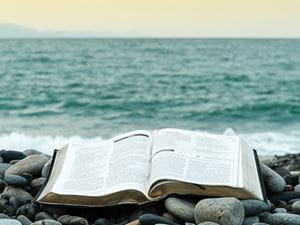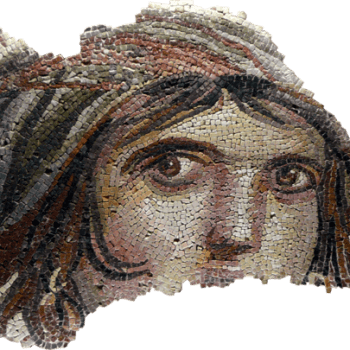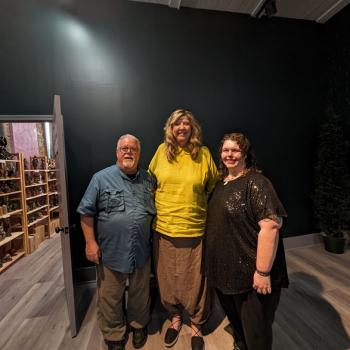
‘Let us come before His face with thanksgiving.’ If I drew near to God in the West of Ireland, it was on the North Atlantic viewing platforms outside the Blasket Centre. There are wonders in this world, on this island, so sublime as to put us in touch with realities we cannot see. Generations have known this to be so.
St. Paul said, in 1 Corinthians, that we see through a glass, darkly. Though the man was well travelled, historians agree that he never made it beyond the Mediterranean, let alone as far as Ireland. Even so, given the divine inspiration at work in his Epistles, I can imagine the glass in Paul’s mind as a churn of aquamarine sea, the vigorous cove 200 metres below Blasket viewpoint.
This article continues my reflections on Psalm 95, as read through the lens of a week spent on the Dingle Peninsula, County Kerry. ‘Do not harden your hearts as you did in the wilderness,’ writes the Psalmist. In this particular wilderness, the West of Ireland, it’s tough to harden your heart. In part one, I referenced Heaney’s poem, “The Peninsula.” His later poem, “Postscript,” observes how the Wild Atlantic Way can ‘catch the heart off guard and blow it open.’
If you knew nothing at all about how the Holy Bible came to be, then Dingle seems a not unlikely spot for Psalm 95 to have been penned. I can easily picture some country priest, seated on the perimeter wall of a shepherd’s field, in between his visits to parishioners, who takes out his devotional journal and writes, ‘we are his people and the sheep of his pasture.’ It’s that sort of a place.
In this unspoiled region, there are corners not yet slathered with internet slime by the greasy tentacles of any telecoms company: NO SERVICE, read my phone’s data sit-rep. All the G’s had apparently fallen from the cliff and into the sea like weary cormorants bloated on pollock: 4G, 3G, 2G… parts of rural Ireland, I have no doubt, are in the negative G’s, cursed with anti-data by druids of old.
Our adventures in County Kerry have already taken in Dingle town for part one, so let’s focus on the wider peninsula before we return there. On the coastal road which enwraps this location, there were some truly prehistoric feats of architecture. One such effort was Dunbeg Fort, a dry-stone defensive structure, built as close to the precipice of a cliff as it’s possible to conceive. Talk about a life on the literal edge; better hope you don’t sleepwalk…
The best way to see these cliffs, incidentally, has to be by boat. So many caves are etched into them by coastal erosion that any seaward rock face in Kerry calls to mind a street in Hobbiton. I thought a member of the Baggins dynasty might emerge for a dander on the water, like some hairy-footed St. Peter.
Shire vibes are ubiquitous further inland also. You will often cross cute stone bridges with moss layered thick in the gaps between slabs like green cement. I would not have been one bit surprised if a column of leprechauns turned up in single file with trowels – the phalanx loudly heralded by their Guinness-fuelled rendition of “Heigh Ho” – to do some light repairs.
It seemed apt, on the final full day that I would spend in Kerry, to take up the Psalmist’s invitation: ‘Come let us worship and bow down and kneel before the Lord our maker.’ It was back to St. Mary’s, then, for Mass. I didn’t receive communion because I’m Anglican and ain’t allowed. Otherwise, I participated.
There are few things more serene in the world of sound than how noises gently bounce around a cavernous church interior. They float with a soft echo from wall to wall. Parishioners took a while to file in, which afforded earlycomers time to drink in every slight shift in the restful ambience.
Unfamiliar liturgies can be quite a challenge to navigate, particularly when the Lord’s Prayer is in Irish, as Gaeilge! The Church of Ireland’s communion rite is extremely similar – a paraphrase, nearly – to the Roman version, and even I found it hard to keep up. It’s all subtle tweaks: ‘And also with you’ (Anglican) vs. ‘And with your spirit’ (Catholic); ‘Glory to You, Lord Jesus Christ’ (Anglican) vs. ‘Glory to you, O Lord’ (Catholic); the Nicene Creed in the first-person plural (Anglican) vs. the Nicene Creed in the first-person singular (Catholic); et cetera.
There was also the use of sung antiphons; ‘O come let us sing out to the Lord,’ after all, is what Psalm 95 invites us to do! The closest we get in the Church of Ireland, and only certain parishes would even do this much, is a sung Sanctus. In our parish, we do this to Schubert’s melody from his German Mass.
The morning after the Mass at St. Mary’s, well-slept and ready for a six-hour homeward run in the car, I departed for Northern Ireland. It was an eventful journey. Tailbacks on the motorway through County Kildare prompted a detour through the town of Newbridge and an encounter there with a conspiracy theorist! “Klaus Schwab is Ireland’s de facto Taoiseach,” declared his very sane placard. In the town there’s a large Pfizer complex, which I guess is a potent magnet for the crazies.
There were some rare sights on Dublin’s M50 ring road, as well. These included a dilapidated red car, whose rear bodywork fluttered in the wind, metal pulled outwards from the chassis like a stiff breeze would yank it off entirely. That was quite unnerving. Several miles later, we passed a vehicle with an unironic ‘EARTH IS FLAT’ LED sign, propped up in the rear windshield. Welcome to the Fair City.
God’s omnipresence, His ‘everywhere-presentness,’ is a major theme in Psalm 95. Being actual God on a full-time basis comes with an enviable front row seat for all humanity’s japes, motorway-based and otherwise. It also means we potentially can experience God anywhere. In some spots, however – ‘thin places,’ to borrow a term from Irish mythology – more of heaven’s music seems to break through.
Dingle Bay feels to me to be such a place.
8/8/2023 8:15:12 PM





